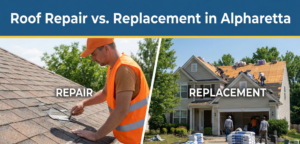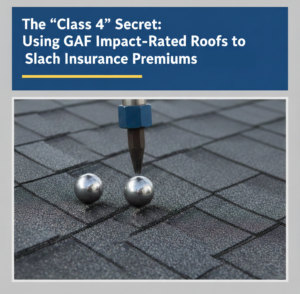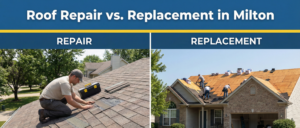There’s a lot to consider when it comes to roof replacement, and understanding the pros of roof replacement, and costs can help you make informed decisions about your home’s future. In fact, the National Roofing Contractors Association states that a new roof can increase your home’s value by up to 15%. As you navigate this process, you’ll want to consult reliable roof repair contractors to ensure your investment pays off. This guide will provide you with important insights, helping you weigh your options effectively.
Understanding Roof Replacement
The process of roof replacement involves removing an existing roof and installing a new one to improve the integrity, safety, and aesthetic appeal of your home. This significant undertaking is not only about aesthetic upgrades but also about ensuring your property is protected from the elements and potential structural issues. By understanding the nuances involved in roof replacement, you can make informed decisions that benefit both your home and your finances.
What Is Roof Replacement?
Below, you’ll find an overview that offers insights into what roof replacement entails. It involves the complete tear-off of your current roofing materials and the installation of new materials. This can range from shingles and tiles to metal roofing, depending on your preferences and budget. Engaging with experienced roof repair contractors will ensure you choose the best materials and practices for your specific situation.
Signs You Need a Roof Replacement
Any visible signs of wear, major leaks, or structural issues may indicate that it is time for a roof replacement. If you notice curling shingles, significant granule loss, or sagging areas, these could be red flags that your roof is no longer protecting your home effectively. A thorough inspection can help identify these potential issues before they lead to expensive damages.
Another key sign of needing a roof replacement includes the age of your roof. Most roofing materials, like asphalt shingles, have a lifespan of about 20-25 years. If your roof is nearing this age, it’s wise to consult with a roof repair company for a professional assessment. Additionally, if you’ve repaired your roof multiple times in a short period, it may be more cost-effective to invest in a full replacement rather than continuing patchwork repairs.
Pros of Roof Replacement
Even if a roof replacement might seem daunting, the pros far outweigh the cons. A new roof can significantly enhance your home’s overall aesthetic appeal, improve structural integrity, and offer better protection against the elements. Investing in your roof today will not only give you peace of mind but can also save you money from hefty roof replacement costs down the line, ensuring your home remains safe.
Improved Home Value
With a new roof, you can expect a notable increase in your home’s market value. According to the National Association of Realtors, a roof replacement can recover up to 68% of its cost when selling your home. This is particularly appealing if you plan to list your home in the near future, as buyers are more likely to favor properties with updated roofs, reducing negotiation hurdles and enhancing your sale prospects.
Enhanced Energy Efficiency
Before replacing your roof, consider how an upgraded roofing system can contribute to improved energy efficiency. Newer materials and technology can substantially lower energy bills by maintaining consistent indoor temperatures and reducing strain on heating and cooling systems. This translates to more savings in your pocket and a smaller carbon footprint.
And the energy efficiency benefits don’t stop there.
Modern roofing options, such as reflective shingles, can effectively minimize heat absorption, leading to reduced cooling costs in warmer months. Research indicates you could save 10%-20% on your energy bills with a well-ventilated and insulated roof. When consulting a roof repair company, be sure to inquire about energy-efficient options that suit your home’s specific needs.
Cons of Roof Replacement
One of the primary considerations when opting for a roof replacement is the potential downsides associated with the project. New roofs can greatly enhance your home’s value and protect your investment, but they also come with considerable challenges that impact your decision. You need to weigh these factors carefully to determine if the benefits outweigh the drawbacks of your unique situation.
High Initial Costs
Along with the advantages of a roof replacement, you should be prepared for the high initial costs that can arise. Investing in a new roof typically ranges between $5,000 and $30,000, depending on various factors such as material, size, and complexity, as suggested by the Home Advisor. Budgeting for these expenses upfront is imperative, as it requires a significant financial commitment that may not always align with your immediate finances.
Disruption During Installation
Cons of getting a new roof include the disruption during installation, which can significantly affect your daily routine. When roof repair contractors are on-site, you may experience noise, debris, and restricted access to various areas of your home.
Initial phases of roof replacement often involve tearing off your old roofing materials, which can create an environment of clutter and noise. You might have to adjust your schedule, stay out of certain rooms, or even vacate the premises temporarily to ensure safety and comfort. Plan for this disruption by communicating with your roofing team about timelines and any inconveniences you may face during the process, allowing you to manage your expectations and daily activities better.
Breakdown of Roof Replacement Cost
All homeowners must understand the cost breakdown when considering a roof replacement. Various factors contribute to the overall expense, including the choice of materials, labor costs, and any necessary permits or inspections. By evaluating these costs, you can make more informed decisions about your roof replacement project.
Average Costs by Material
Among the various roofing materials, costs can vary significantly. For instance, asphalt shingles may range from $90 to $100 per square, while metal roofing might start at $120 and go up to $900 per square, depending on the type and quality. You should be aware that these figures can fluctuate based on market conditions and regional differences.
Factors Influencing Price
With any roof replacement, several factors influence the final price you’ll pay. These include the roof’s size, steepness, your location, and the existing roof condition. Additionally, if you hire roof repair contractors, labor rates will vary based on expertise and demand. Other potential costs can include:
- Permits required by your local government
- Removal of the old roofing material
- Any necessary repairs to the underlying structure
The final roof replacement cost can be significantly affected by these factors.
Average expenses for roof replacement can also fluctuate depending on the variables above. You might find unique pricing in your area based on labor availability or material sourcing. It’s wise to compare quotes from multiple roof repair contractors to secure the best deal. Ultimately, your investment will reflect on the longevity and durability of your new roof.
- The complexity of the installation process
- Seasonal demand and time of year
- Additional features, such as skylights or ventilation systems
The final estimation is something you should thoroughly evaluate before beginning your project.
Choosing the Right Roofing Material
For your roof replacement, selecting the right roofing material is vital as it directly impacts your home’s longevity, energy efficiency, and aesthetic appeal. With numerous options available, you should consider factors such as climate, cost, and maintenance when making your decision. Consulting with roof repair companies can provide valuable insights tailored to your specific needs.
Asphalt Shingles
One of the most popular choices for roofing, asphalt shingles offer affordability and a wide range of styles. These shingles are easy to install, making them a favored option for many homeowners. You can choose from various colors and designs to complement your home’s exterior, providing both functionality and aesthetic appeal.
Metal Roofing
Against common belief, metal roofing is not only durable but also environmentally friendly. With aluminum, steel, or copper options, you get a roofing material that can last 40 to 70 years, significantly outperforming asphalt shingles. Metal roofs are energy-efficient, capable of reflecting heat, and can lower your cooling costs. Additionally, they are resistant to wind and snow, making them ideal for various climates.
In fact, metal roofs can save you up to 25% on your energy bills; they require less maintenance over time and can often increase the resale value of your home due to their durability and energy efficiency. While the initial cost may be higher than traditional materials, the longevity and savings make it a worthwhile investment. Engaging qualified roof repair contractors can help you determine the best metal roofing options for your specific situation.
Hiring a Roofing Contractor
Once again, choosing the right roofing contractor is important for a successful roof replacement. Your home deserves the best, and an experienced professional will ensure that the job is done correctly and efficiently. Take the time to research potential contractors, check their credentials, and read reviews to make an informed decision about who to trust for your roofing needs.
Questions to Ask
An important part of hiring a roofing contractor is preparing a list of questions that will help you gauge their suitability for your project. Inquire about their experience in roof replacement, license and insurance status, warranties offered, and the materials they recommend. It’s also beneficial to ask for references from previous clients to understand their work ethic and reliability.
Red Flags to Watch For
Roofing contractors can vary significantly, and it’s vital to recognize potential red flags when selecting one for your roof replacement.
Even small warning signs can indicate bigger issues down the line. Look out for contractors who demand large upfront payments, lack appropriate licensing or insurance, or provide vague estimates without a detailed breakdown. If they fail to communicate clearly about the project timeline or seem hesitant to answer your questions, it may be time to seek other options.
To wrap up
Presently, understanding the pros, cons, and costs associated with roof replacement is necessary for you as a homeowner. By weighing these factors carefully and consulting reliable roof repair contractors, you can make informed decisions that meet your needs and budget. Ultimately, ensuring your roof is in top shape protects your home and enhances its value, making your investment worthwhile.
Moreover, if you want professional help, Choose My Pro Roofing for reliable and expert roof repair services. With expert craftsmanship, high-quality materials, and prompt service, we ensure your roof stays strong and secure. Trust us to protect your home.
FAQs
Q: How do I determine if I need a roof replacement or just repairs?
A: To decide between roof replacement and repairs, a professional assessment is key. If your roof is experiencing issues such as leaks, missing shingles, or rot, a roof inspection by certified roof repair contractors will help determine the extent of the damage. Additionally, if your roof is over 20 years old, replacing it may save you money in the long run due to ongoing repair costs.
Q: What costs should I anticipate with roof replacement?
A: The cost of roof replacement varies based on several factors, including material choice, roof size, and labor rates. On average, homeowners can expect to pay between $5,000 to $15,000 for a full roof replacement, depending on their location and the complexity of the project.
Q: What materials are commonly used for roof replacement, and how do they impact costs?
A: Common materials for roof replacement include asphalt shingles, metal roofing, tile, and wood shakes. Asphalt shingles are typically the most affordable option, averaging $3.50 to $5.50 per square foot. Metal roofing can range from $6 to $12 per square foot, offering longevity and energy efficiency benefits. The choice of material not only affects upfront costs but also considers lifespan, maintenance, and insurance implications.
Q: Can I perform a roof replacement myself, or should I hire professionals?
A: While DIY roof replacement might seem cost-effective, it requires substantial knowledge and experience to ensure safety and structural integrity. For most homeowners, hiring professional roof repair contractors is highly recommended. Professionals possess the skills to assess roof conditions, manage material selection, and comply with local building codes.




